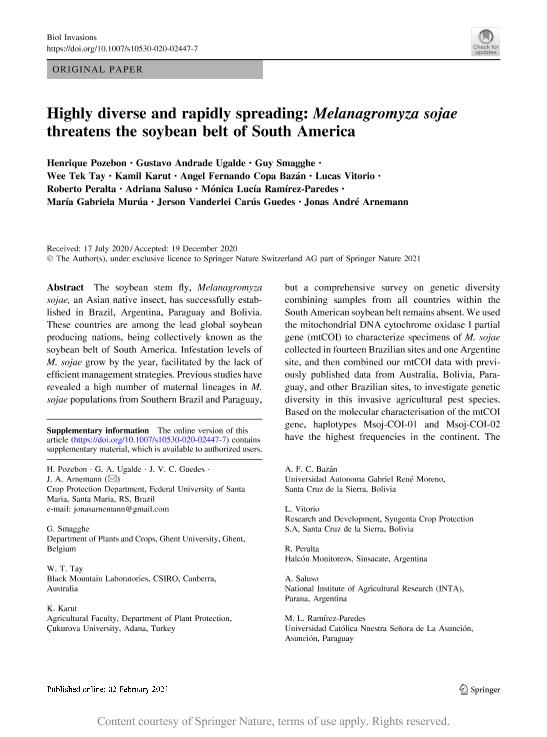Artículo
Highly diverse and rapidly spreading: Melanagromyza sojae threatens the soybean belt of South America
Henrique Pozebon; Ugalde, Gustavo Andrade; Smagghe, Guy; Tay, Wee Tek; Karut, Kamil; Copa Bazán, Angel Fernando; Vitorio, Lucas; Peralta, Roberto; Saluso, Adriana; Ramírez Paredes, Mónica Lucía; Murúa, María Gabriela ; Vanderlei Carús Guedes, Jerson; Arnemann, Jonas André
; Vanderlei Carús Guedes, Jerson; Arnemann, Jonas André
 ; Vanderlei Carús Guedes, Jerson; Arnemann, Jonas André
; Vanderlei Carús Guedes, Jerson; Arnemann, Jonas André
Fecha de publicación:
05/2021
Editorial:
Springer
Revista:
Biological Invasions
ISSN:
1387-3547
Idioma:
Inglés
Tipo de recurso:
Artículo publicado
Clasificación temática:
Resumen
The soybean stem fly, Melanagromyza sojae, an Asian native insect, has successfully established in Brazil, Argentina, Paraguay and Bolivia. These countries are among the lead global soybean producing nations, being collectively known as the soybean belt of South America. Infestation levels of M. sojae grow by the year, facilitated by the lack of efficient management strategies. Previous studies have revealed a high number of maternal lineages in M. sojae populations from Southern Brazil and Paraguay, but a comprehensive survey on genetic diversity combining samples from all countries within the South American soybean belt remains absent. We used the mitochondrial DNA cytochrome oxidase I partial gene (mtCOI) to characterize specimens of M. sojae collected in fourteen Brazilian sites and one Argentine site, and then combined our mtCOI data with previously published data from Australia, Bolivia, Paraguay, and other Brazilian sites, to investigate genetic diversity in this invasive agricultural pest species. Based on the molecular characterisation of the mtCOI gene, haplotypes Msoj-COI-01 and Msoj-COI-02 have the highest frequencies in the continent. The high genetic diversity found is evidence of introductions involving multiple female founders into the continent, and the high proportion of unique mtDNA haplotypes identified from Brazil, Paraguay and Bolivia (~ 50%) suggests potential novel introductions have taken place. The findings from our study will contribute to a better understanding of M. sojae genetic diversity in South America, supporting the development of management strategies for this highly invasive pest and assisting with biosecurity preparedness of other emerging Agromyzidae flies of economic importance.
Archivos asociados
Licencia
Identificadores
Colecciones
Articulos(ITA-NOA)
Articulos de INST. DE TECNOLOG. AGROINDUST. DEL NOROESTE ARGENTINO
Articulos de INST. DE TECNOLOG. AGROINDUST. DEL NOROESTE ARGENTINO
Citación
Henrique Pozebon; Ugalde, Gustavo Andrade; Smagghe, Guy; Tay, Wee Tek; Karut, Kamil; et al.; Highly diverse and rapidly spreading: Melanagromyza sojae threatens the soybean belt of South America; Springer; Biological Invasions; 23; 5; 5-2021; 1405-1423
Compartir
Altmétricas



